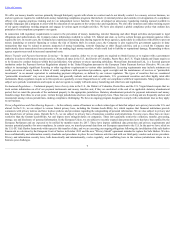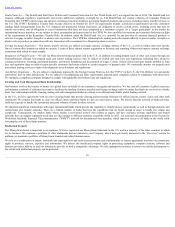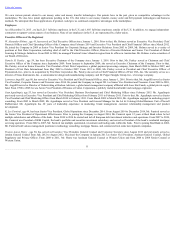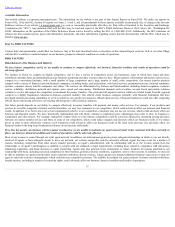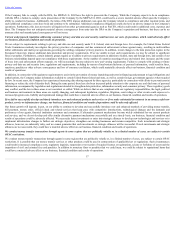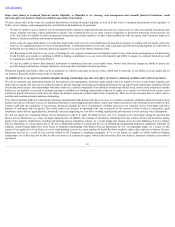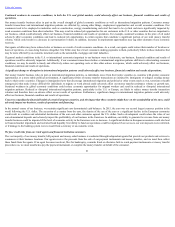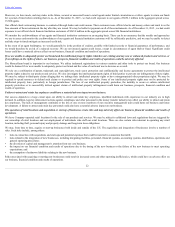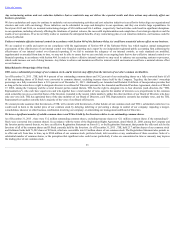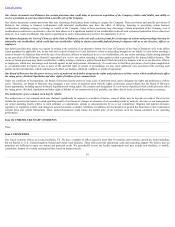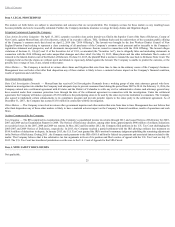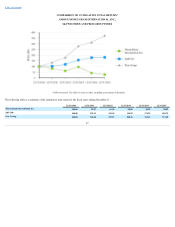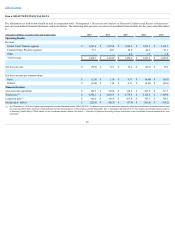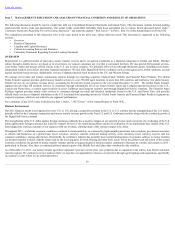MoneyGram 2015 Annual Report Download - page 20
Download and view the complete annual report
Please find page 20 of the 2015 MoneyGram annual report below. You can navigate through the pages in the report by either clicking on the pages listed below, or by using the keyword search tool below to find specific information within the annual report.
Table of Contents
Major bank failure or sustained financial market illiquidity, or illiquidity at our clearing, cash management and custodial financial institutions, could
adversely affect our business, financial condition and results of operations.
We face certain risks in the event of a sustained deterioration of financial market liquidity, as well as in the event of sustained deterioration in the liquidity, or
failure, of our clearing, cash management and custodial financial institutions. In particular:
•We may be unable to access funds in our investment portfolio, deposit accounts and clearing accounts on a timely basis to settle our payment instruments, pay
money transfers and make related settlements to agents. Any resulting need to access other sources of liquidity or short-term borrowing would increase our
costs. Any delay or inability to settle our payment instruments, pay money transfers or make related settlements with our agents could adversely impact our
business, financial condition and results of operations.
•In the event of a major bank failure, we could face major risks to the recovery of our bank deposits used for the purpose of settling with our agents, and to the
recovery of a significant portion of our investment portfolio. A substantial portion of our cash, cash equivalents and interest-bearing deposits are either held at
banks that are not subject to insurance protection against loss or exceed the deposit insurance limit.
• Our Revolving Credit Facility is one source of funding for our corporate transactions and liquidity needs. If any of the banks participating in our Revolving
Credit Facility were unable or unwilling to fulfill its lending commitment to us, our short-term liquidity and ability to engage in corporate transactions, such
as acquisitions, could be adversely affected.
• We may be unable to borrow from financial institutions or institutional investors on favorable terms, which could adversely impact our ability to pursue our
growth strategy and fund key strategic initiatives, such as product development and acquisitions.
If financial liquidity deteriorates, there can be no assurance we will not experience an adverse effect, which may be material, on our ability to access capital and on
our business, financial condition and results of operations.
An inability by us or our agents to maintain adequate banking relationships may adversely affect our business, financial condition and results of operations.
We rely on domestic and international banks for international cash management, electronic funds transfer and wire transfer services to pay money transfers and
settle with our agents. We also rely on domestic banks to provide clearing, processing and settlement functions for our paper-based instruments, including official
checks and money orders. Our relationships with these banks are a critical component of our ability to conduct our official check, money order and money transfer
businesses. An inability on our part to maintain existing or establish new banking relationships sufficient to enable us to conduct our official check, money order
and money transfer businesses could adversely affect our business, financial condition and results of operations. There can be no assurance that we will be able to
establish and maintain adequate banking relationships.
If we cannot maintain sufficient relationships with large international banks that provide these services, we would be required to establish a global network of local
banks to provide us with these services or implement alternative cash management procedures, which may result in increased costs. Relying on local banks in each
country could alter the complexity of our treasury operations, degrade the level of automation, visibility and service we currently receive from banks and affect
patterns of settlement with our agents. This could result in an increase in operating costs and an increase in the amount of time it takes to concentrate agent
remittances and to deliver agent payables, potentially adversely impacting our cash flow, working capital needs and exposure to local currency value fluctuations.
We and our agents are considered Money Service Businesses in the U.S. under the Bank Secrecy Act. U.S. regulators are increasingly taking the position that
Money Service Businesses, as a class, are high risk businesses. In addition, the creation of anti-money laundering laws has created concern and awareness among
banks of the negative implications of aiding and abetting money laundering activity. As a result, banks may choose not to provide banking services to Money
Services Businesses in certain regions due to the risk of additional regulatory scrutiny and the cost of building and maintaining additional compliance functions. In
addition, certain foreign banks have been forced to terminate relationships with Money Services Businesses by U.S. correspondent banks. As a result, we and
certain of our agents have been denied access to retail banking services in certain markets by banks that have sought to reduce their exposure to Money Services
Businesses and not as a result of any concern related to the Company’s compliance programs. If we or our agents are unable to obtain sufficient banking
relationships, we or they may not be able to offer our services in a particular region, which could adversely affect our business, financial condition and results of
operations.
19


